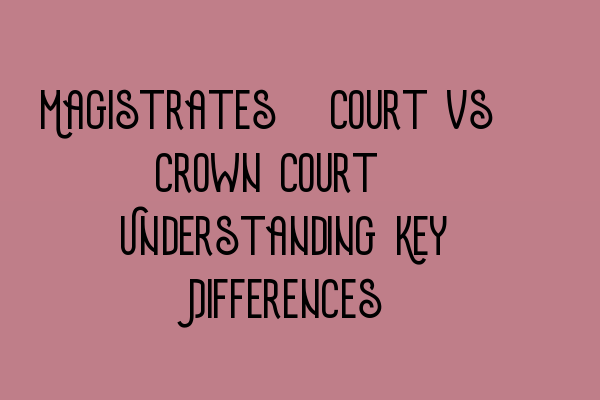Magistrates’ Court vs. Crown Court: Understanding Key Differences
Welcome to the SQE Criminal Law & Practice Law UK blog, where we aim to provide you with valuable insights and information on various aspects of criminal law. In this article, we will explore the key differences between Magistrates’ Court and Crown Court, two important elements of the criminal justice system in the UK.
What is Magistrates’ Court?
Magistrates’ Court is the lower court in the UK’s criminal justice system. It is presided over by magistrates, who are usually laypersons appointed to sit as judges. Magistrates’ Court deals with less serious criminal offenses, such as traffic offenses, minor assaults, and low-value theft cases. The court also handles preliminary hearings for more serious offenses before transferring the case to Crown Court.
If you are pursuing a career in criminal law, understanding the workings of the Magistrates’ Court is essential. The court’s procedures, rules, and sentencing powers are distinct from those of the Crown Court, and being well-versed in these differences can greatly benefit your legal practice. To test your knowledge of the Magistrates’ Court procedures, check out our SQE 1 Practice Exam Questions article.
What is Crown Court?
Crown Court, on the other hand, is the higher court in the UK’s criminal justice system. It deals with more serious criminal offenses, such as murder, rape, drug trafficking, and large-scale fraud cases. Crown Court trials are presided over by judges and are often jury trials. The court has the power to impose longer sentences and handle complex legal matters.
If you’re preparing for the SQE exams and looking for practice materials related to criminal law, our SQE 1 Practice Mocks FLK1 FLK2 article can provide you with valuable resources to enhance your understanding and knowledge.
Key Differences between Magistrates’ Court and Crown Court
Now, let’s delve deeper into the key differences between Magistrates’ Court and Crown Court:
- Nature of Offenses: Magistrates’ Court deals with less serious offenses, while Crown Court deals with more serious and complex crimes.
- Trial Process: Magistrates’ Court holds summary trials, which are typically shorter and less formal. Crown Court conducts more extensive trials, often lasting several days or even weeks.
- Sentencing Powers: Magistrates’ Court has limited sentencing powers, usually up to six months’ imprisonment for a single offense. Crown Court can impose more severe sentences, including life imprisonment for serious crimes.
- Legal Representation: In Magistrates’ Court, defendants are often unrepresented or assisted by a solicitor. In Crown Court, legal representation is more common, with defendants having the right to be represented by a barrister.
- Jurisdiction: Magistrates’ Court has jurisdiction over the majority of criminal cases, while Crown Court handles only the most serious cases and cases transferred from Magistrates’ Court.
For comprehensive preparation for the SQE exams, including criminal law, please visit our SQE 2 Preparation Courses and SQE 1 Preparation Courses articles. These courses will equip you with the necessary knowledge and skills to excel in your legal career.
Conclusion
Understanding the key differences between Magistrates’ Court and Crown Court is crucial for any aspiring criminal lawyer. By knowing the nuances of these courts, you can better navigate the criminal justice system, provide effective representation to your clients, and achieve successful outcomes. Stay updated with the SRA SQE Exam Dates to plan your exam preparation accordingly.
For more in-depth articles on criminal law and other legal topics, be sure to follow our blog. If you have any questions or would like to discuss criminal law matters further, don’t hesitate to contact us. Our team of experienced solicitors is here to assist you.
Thank you for reading!
